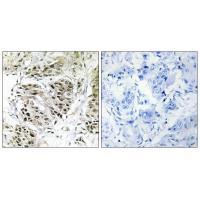
| WB | 咨询技术 | Human,Mouse,Rat |
| IF | 咨询技术 | Human,Mouse,Rat |
| IHC | 1/50-1/100 | Human,Mouse,Rat |
| ICC | 技术咨询 | Human,Mouse,Rat |
| FCM | 咨询技术 | Human,Mouse,Rat |
| Elisa | 咨询技术 | Human,Mouse,Rat |
| Aliases | CENA; CENP-A; Centromere autoantigen A; Centromere protein A; |
| Entrez GeneID | 1058; |
| WB Predicted band size | 16kDa |
| Host/Isotype | Rabbit IgG |
| Antibody Type | Primary antibody |
| Storage | Store at 4°C short term. Aliquot and store at -20°C long term. Avoid freeze/thaw cycles. |
| Species Reactivity | Human |
| Immunogen | Synthesized peptide derived from internal of human CENPA. |
| Formulation | Purified antibody in PBS with 0.05% sodium azide. |
+ +
以下是关于CENPA抗体的3篇参考文献及其简要摘要:
---
1. **文献名称**: **"CENP-A is a genomic centromere-specific histone H3 variant essential for kinetochore assembly"**
**作者**: Carroll, C.W. et al.
**摘要**: 该研究通过免疫荧光和染色质免疫沉淀(ChIP)技术,利用CENPA抗体揭示CENP-A作为着丝粒特异性组蛋白H3变体的功能,证明其是染色体动粒组装的关键因子,并调控有丝分裂中染色体的稳定性。
---
2. **文献名称**: **"Overexpression of CENPA in hepatocellular carcinoma is associated with tumor progression and poor prognosis"**
**作者**: Li, Y. et al.
**摘要**: 通过免疫组化(IHC)和Western blot实验,使用CENPA抗体分析肝癌组织样本,发现CENPA在肝癌中异常高表达,其水平与肿瘤分期、转移及患者生存率显著相关,提示其作为潜在预后标志物的价值。
---
3. **文献名称**: **"CENPA promotes homologous recombination repair in cancer cells by sustaining replication fork integrity"**
**作者**: Shrestha, R.L. et al.
**摘要**: 研究利用CENPA抗体进行ChIP-seq和细胞成像,阐明CENPA通过维持复制叉稳定性促进同源重组修复的机制,其缺失会导致DNA损伤积累并增强癌细胞对化疗的敏感性。
---
如果需要更详细的信息或特定研究方向的文献,请补充说明!
CENPA (Centromere Protein A) is a histone H3 variant specifically incorporated into nucleosomes at centromeric regions, playing a critical role in maintaining centromere identity and ensuring accurate chromosome segregation during cell division. Unlike canonical histones, CENPA replaces H3 in centromeric chromatin, forming a specialized epigenetic mark essential for recruiting kinetochore proteins and facilitating microtubule attachment. Its dysregulation is linked to chromosomal instability, aneuploidy, and cancer progression.
CENPA antibodies are indispensable tools for studying centromere biology. They enable the detection, localization, and functional analysis of CENPA in diverse experimental settings, including immunofluorescence, chromatin immunoprecipitation (ChIP), and Western blotting. These antibodies help visualize centromere dynamics during the cell cycle, assess CENPA deposition mechanisms, and investigate its role in diseases. For example, elevated CENPA expression in cancers correlates with poor prognosis, making it a potential diagnostic or therapeutic target.
Structurally, CENPA contains a conserved histone fold domain for nucleosome assembly and a divergent N-terminal tail that interacts with kinetochore components. Antibodies targeting specific epitopes (e.g., N-terminal regions) are often used to distinguish CENPA from other histones. Recent studies also utilize CENPA antibodies to explore artificial chromosome engineering and epigenetic therapies. Rigorous validation (e.g., knockout controls) is critical to ensure antibody specificity, given the high homology among histone variants.
×